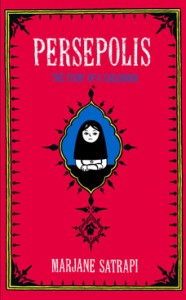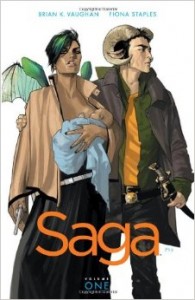 As 2015 comes to an end, we’re taking a look back at our 15 most-read stories of the past year. In many cases we’ve also included links to follow-ups or other related stories.
As 2015 comes to an end, we’re taking a look back at our 15 most-read stories of the past year. In many cases we’ve also included links to follow-ups or other related stories.
College Student Wants Graphic Novels Banned from Graphic Novel Course
In June, CBLDF rose to the defense of comics at Crafton Hills College in California. A 20-year-old student and her parents sought to have four graphic novels covered in an elective English class that she had completed in May “eradicated from the system.” Tara Shultz, who is working towards an Associate Degree in English, knew when she began the course in January that it focused on graphic novels but said she “expected Batman and Robin, not pornography.” Shultz contacted her parents, and the family challenged the inclusion of four of the ten books taught by Associate Professor Ryan Bartlett: Persepolis by Marjane Satrapi, Fun Home by Alison Bechdel, Y: The Last Man Vol. 1 by Brian K. Vaughan and Pia Guerra, and The Sandman Vol. 2: The Doll’s House by Neil Gaiman and various artists.
Crafton Hills declined to modify its curriculum based on the family’s complaint but hinted at requiring a disclaimer on the syllabus in the future “so students have a better understanding of the course content.” After CBLDF and members of the National Coalition Against Censorship sent a letter urging against that action, the San Bernardino Community College District ultimately decided not to implement such a requirement for Crafton Hills and its other campus, San Bernardino Valley College.
- College Student Wants Four Graphic Novels “Eradicated from the System”
- CBLDF Joins Coalition Opposed to Disclaimer for College Literature Course
- Crafton Hills College Stands By Graphic Novel Course
- VICTORY in CA: Crafton Hills College Will Not Require Disclaimer on Graphic Novel Course
Emails Provide Insight on Persepolis Ban in Chicago Public Schools
Nearly two years after Chicago Public Schools’ botched attempt to ban Persepolis from classrooms and libraries, University of Illinois graduate student Jarrett Dapier submitted a Freedom of Information Act request to obtain the release of internal emails showing district administrators’ scramble to remove the book from schools and then spin the story to deflect negative feedback from students, staff, media, and free speech organizations.
- Grad Student Uncovers Truth About Persepolis Ban in Chicago Public Schools
- EXCLUSIVE: CBLDF Talks to Persepolis Sleuth Jarrett Dapier!
Women Who Changed Free Expression
Throughout Women’s History Month in March, we ran a series of 23 biographical profiles on our Tumblr featuring women who changed free expression in comics from the Pre-Code era through the present day. On the final day of the month, we brought them all together and it became one of our most-read stories of the year!
 Another Student Investigated for “Death Note”
Another Student Investigated for “Death Note”
In October we saw a repeat of what has become a familiar story: a high school-aged New Hampshire fan of the Death Note manga and anime series compiled a list of classmates’ names in a “death note” book, and panic ensued among parents even after police investigated and determined the student had not engaged in “criminal threatening” or any other crimes. In the past eight years, at least 10 U.S. students ranging from elementary to high school were disciplined, suspended, expelled, or arrested after “death notes” were found in their possession.
CBLDF’s Charles Brownstein Counters UN Call to Ban “Extreme” Manga
After UN Special Envoy Maud de Boer-Buquicchio recommended that Japan take steps to “ban manga of extreme child pornographic content” along with a host of other tips for curtailing child sexual abuse in the country, CBLDF Executive Director Charles Brownstein wrote an in-depth commentary analyzing the cultural differences in the way manga is received and the reasons why banning manga would accomplish nothing to protect actual children.
Young Adult Graphic Novels Shine During Banned Books Week
This year’s theme for Banned Books Week was Young Adult literature, so we featured 12 YA graphic novels that have been challenged or banned over the years.
 Most Challenged Books of 2014
Most Challenged Books of 2014
In 2014 alone, three graphic novels — Saga, Drama, and Persepolis — made the American Library Association’s list of the Top Ten Most Frequently Challenged Books.
- Three Graphic Novels Among ALA’s Ten Most Challenged Books of 2014
- What Do We Know About the Frequently Challenged Comics of 2014?
- CBLDF Executive Director Responds to Most Frequently Challenged List
UN Envoy Calls for Ban on “Extreme” Manga
After a week-long fact-finding trip searching for strategies to curtail underage sex-trafficking in Japan, UN Special Envoy Maud de Boer-Buquicchio made a number of perfectly sound recommendations, but also advised that the country ban manga and anime that includes “particular, extreme child pornographic content,” even though it does not involve any actual children. She is expected to provide more detail on her recommendations with a full report to the UN Human Rights Council in March 2016.
Atena Farghadani Sentenced for Cartoon
Iranian artist and activist Atena Farghadani was given a draconian sentence of nearly 13 years in prison for drawing a cartoon depicting lawmakers as apes and bovines. The cartoon mocked a bill that would ban voluntary sterilization procedures such as vasectomies and tubal ligations in an effort to reverse Iran’s falling birthrate.
After her sentencing which followed a cursory trial, Farghadani’s troubles continued as she and her lawyer were both charged with “non-adultery illegitimate relations” because they shook each other’s hands. Contact with unrelated members of the opposite sex is illegal in Iran, but rarely prosecuted. It was later disclosed that in the course of this secondary investigation, Farghadani was subjected to forced virginity and pregnancy tests.
In September, Cartoonists Rights Network International honored Farghadani in absentia with its Courage in Editorial Cartooning Award.
- Cartoonist Sentenced to 12 Years in Prison for Mocking Birth Control Bill
- Iranian Cartoonist Faces Prison, Floggings for Mocking Birth Control Bill
- Cartoonists #Draw4Atena
- Atena Farghadani’s Lawyer Also Under Arrest in Iran
- Fellow Cartoonists Honor Atena Farghadani at CRNI Courage Award Ceremony
- Farghadani Subjected to Virginity Test in Investigation of “Illegitimate Relations”
Curious Incident Banned in Florida
In August, a high school principal in Leon County, Florida violated district policy by pulling Mark Haddon’s The Curious Incident of the Dog in the Night-Time from a summer reading list after a few parents complained of profanity and other “inappropriate” content in the book. CBLDF and other members of the Kids’ Right to Read Project sent a letter urging district officials to follow existing policy, but unfortunately the school board backed the principal’s action.
- Principal Violates School Policy, Bans Book Without Consulting Review Committee
- CBLDF Joins Coalition Protesting Curious Ban in Florida
- School Board Stands by Curious Censorship in Florida
- Florida Student Chastises Schools and Parents for Curious Censorship
The Charlie Hebdo Attack
The year began in tragedy, as 12 people including five cartoonists were killed in a terrorist attack on the offices of the French satirical weekly Charlie Hebdo. The ambush was in retaliation for the magazine’s occasional caricatures of the Prophet Muhammad, among many other religious and political figures. The repercussions of the attack were evident in numerous stories throughout 2015 and surely for many years to come.
- CBLDF Joins Condemnation of Charlie Hebdo Attack
- BREAKING NEWS: Charlie Hebdo Attack Kills 12, Including 5 Cartoonists
- World Mourns Victims of Charlie Hebdo Attack
- Stand Up for Free Speech: Publish Charlie Hebdo’s Cartoons
- A Moment of Speech: Charlie Hebdo’s Controversial Cartoons
- Cartoonists Around the World Stand In Support of Charlie Hebdo
- Still Defiant: New Issue of Charlie Hebdo Sells Out
More Americans Support Censorship
An early 2015 poll of more than 2,000 Americans revealed a disturbing trend: Since 2011, the percentage of Americans who believe that there are books that should be banned has increased from 18% to 28%. Perhaps even more disturbing, only 48% of Americans stated that books should never be banned.
 Palomar Challenged in Rio Rancho
Palomar Challenged in Rio Rancho
Rejecting one parent’s complaint that the highly-regarded graphic novel Palomar by Gilbert Hernandez was “child porn,” a district review committee in Rio Rancho, New Mexico, voted to keep the book in a high school library. CBLDF led a coalition that included NCAC in defending the book after it was attacked in a lurid and biased news report from local TV affiliate KOAT, which continued its attack after the decision to keep the book was announced. The win was tempered by news that the parent was going to appeal the review committee’s decision to the school board, but school board meeting minutes reveal no further discussion of the challenge.
Although Palomar is technically back in the RRHS library, the victory is qualified: A parental signature is now required for anyone under 18 who would like to check out the book.
- Gilbert Hernandez’s Palomar Challenged in New Mexico High School
- CBLDF Rises to Defend Gilbert Hernandez’s Palomar
- Rio Rancho Public Schools to Observe Challenge Policy for Palomar
- Palomar Stays on Shelves in Rio Rancho
- Rio Rancho Parent Appeals Palomar Decision
- New Mexico TV Station Continues Vendetta Against Palomar
- Palomar Back in Rio Rancho Schools–But Restricted
- Emails Show Confused Response to Palomar Challenge in Rio Rancho
Magazine Loses Spiegelman Cover
A May issue of the UK’s New Statesman magazine, on the theme of “Saying the Unsayable,” was originally slated to feature a cover by Art Spiegelman. But the legendary creator of Maus pulled the cover “at the very last minute” by his own description, when the magazine reneged on an informal agreement to also print his “First Amendment Fundamentalist” piece reflecting on the Charlie Hebdo attack.
The issue was guest-edited by Neil Gaiman and Amanda Palmer, who according to Spiegelman were blameless in the incident but wound up getting “mugged in the crossfire.” At Gaiman’s blog, they provided an extensive joint account of events.
The Tweeks Read SideScrollers
This summer twin tween geeks Maddy and Anya Ernst, aka the Tweeks, embarked on a Challenged Graphic Novel Reading Challenge and invited readers everywhere to join in via their podcast and the ComicMix website. Their assessment of Matthew Loux’s gaming adventure SideScrollers rounded out our top 15 stories of 2015!
- Tweeks Remind SideScrollers Challengers That They Don’t Have to Read It
- ComicMix’s Tweeks Challenge Kids and Parents to Read Challenged Comics This Summer!
Help support CBLDF’s important First Amendment work in 2016 by visiting the Rewards Zone, making a donation, or becoming a member of CBLDF!